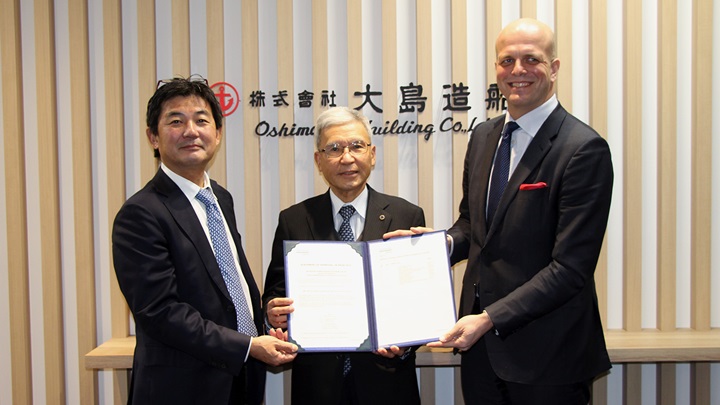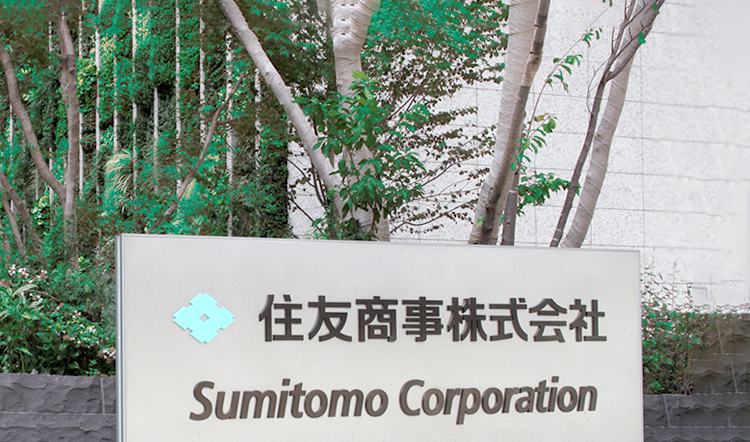Jan. 06, 2023
Growth of Ship & Marine Project business and further collaboration with Oshima Shipbuilding~Contribution to a sustainable maritime industry~
Sumitomo Corporation's Ship & Marine Business and its Surrounding Environment
Beginning with marine equipment business in the 1960s, Sumitomo Corporation has been engaged in a wide range of businesses in the maritime value chain, including contracting of newbuilding ships built by Japanese shipyards, trading business for arranging sale & purchase of secondhand ships and ship financing, and ship owning business to generate operating revenue from own ships. Since the 1970s, Sumitomo Corporation has also participated in the shipbuilding business through our partnership with Oshima Shipbuilding.
In line with the movement to realize a decarbonized society, the shipping industry is also facing major changes, as the International Maritime Organization (IMO) set goals to improve the average fuel consumption of ships engaged in international shipping by 40 percent by 2030, compared to 2008 levels, and to reduce total greenhouse gas emissions by half by 2050.
Sumitomo Corporation Group is coworking within the group, including Oshima Shipbuilding, on various projects to contribute to the decarbonization of the maritime industry.
Approval in Principle for Ammonia Fueled Ship
Sumitomo Corporation and Oshima Shipbuilding announced the joint development of an ammonia-fueled ship in December 2021, and on December 5, 2022, DNV, an international ship classification society, issued approval in principle for an ammonia-fueled ship. This approval indicates that the design of the ammonia-fueled ship developed by Sumitomo Corporation and Oshima Shipbuilding has been confirmed to meet the technical requirements and safety standards after HAZID (Hazard Identification Study) on the risks associated with the use of ammonia as fuel, marking an important milestone in the development of a new type of ship. At the ceremony, Mr. Stian Erik Sollied, Country Manager of DNV Japan Maritime, said, "We are very pleased to be a part of this innovative project with such forward leaning partners. DNV has been pioneering the research and development of viable future marine fuels, and we will continue our cooperation with Sumitomo Corporation and Oshima Shipbuilding to support the industry in bringing new low-carbon ship designs to life in a safe and sustainable manner." and confirmed further cooperation with Sumitomo Corporation and Oshima Shipbuilding in their efforts to decarbonize the maritime industry.
Sumitomo Corporation and Oshima Shipbuilding will accelerate the development and marketing activities of ammonia-fueled ships, as well as improving the operational environment, including the supply of ammonia fuel, through internal and external collaboration, aiming to reduce carbon dioxide emissions in the entire supply chain.

Future Vision of Sumitomo Corporation's Ship & Marine Business
Sumitomo Corporation's ship & marine business aims to "Contribute to climate change mitigation and regional economic development in the shipping and shipbuilding industry, which supports the foundation of global prosperity".
Oshima Shipbuilding, which plays an important role, will contribute to the realization of a sustainable society through research and development of new fuels and technologies, starting with the acquisition of approval in principle for ammonia-fueled ships.
Sumitomo Corporation will promote the development of this ammonia-fueled ship through collaboration with the long-time partner, Oshima Shipbuilding, and partners within the shipbuilding and marine transportation industry, including DNV and at the same time will also study and develop ammonia production, transportation/storage, bunkering business, etc. by collaborating with relevant internal departments.
Sumitomo Corporation will promote the development of the entire ammonia value chain and contribute to the decarbonization of the maritime industry.



